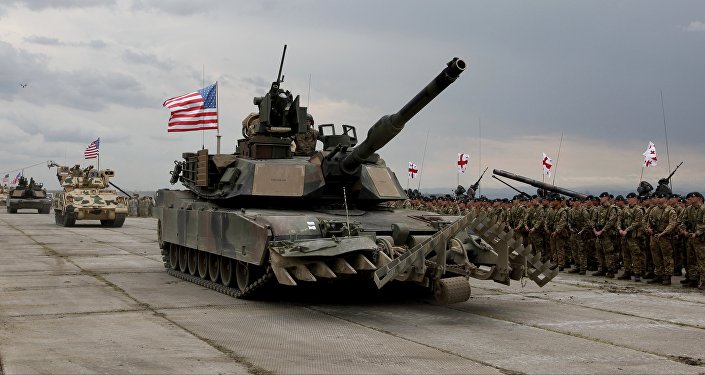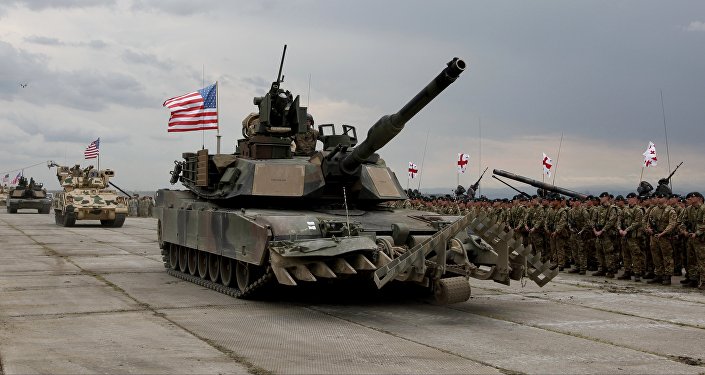The US spends more on its military than the next seven nations combined. Russian military spending is a fraction of US spending. The US spends an enormous amount on the military to maintain its empire, says Daniel McAdams, executive director, Ron Paul Peace Institute.
Russia’s Foreign Minister Sergey Lavrov Friday met NATO Secretary General Jens Stoltenberg on the sidelines of the annual Munich Security Conference. Although both admitted the need for dialogue, the mood at the table was palpably tense.
“NATO’s expansion has led to an unprecedented level of tension over the last 30 years in Europe,” Lavrov told the Munich conference.
Statements made by Western politicians at the Munich Security Conference indicate that the Cold War is not over yet, he said.
“They say that all wars begin in the minds of people, and by this logic, that’s where they are supposed to come to an end. However, this hasn’t been the case with the Cold War yet, [at least] judging by some speeches of politicians in Europe and in the US, including statements that were made yesterday and today at the beginning of our conference,” the Russian Foreign Minister noted.
Meanwhile, there is also dissonance among Western leaders, including the issue of NATO expenses, as the Trump administration calls on European members to pay their bills to the 28-member defense bloc and boost defense spending.
RT: Can this split that we see happening among the US, the European Union and Russia deepen? What can we read into the situation at this time?
Daniel McAdams: I think it is all very healthy because everyone is going to have their bluff called. The Europeans are screaming about ‘Russian aggression’ and how they must do something about Russian aggression. Obviously if they felt threatened they would spend more of their own money defending themselves, as any normal person would have if they felt threatened.
The US on the other hand wants to essentially have an empire, but wants the Europeans to be subservient, and President Trump wants to do the impossible which is to spend a trillion dollars a year on the military; a trillion dollars a year on infrastructure, and however much on an upgraded nuclear arsenal – it is absolutely impossible. So heads are going to clash, and it is a very good thing because it might bring us to reassessing what are our defense objectives, rather than what are the US military empire’s objectives.
RT: Do you think Donald Trump will take a harder line than his predecessors on getting other states to pay up? What is he going to do?
DM: There is a fundamental clash, as I said earlier. And there will be one between [Jean-Claude] Juncker and Trump. And I welcome it; I’ll pop the popcorn to see that. I think it is very helpful to have these clashes. The US spends more on its military than the next seven nations combined. The Russian military spending, I think, is one-seventh or one-tenth of the US spending. So the fact of the matter is the US spends an enormous amount on the military to maintain its empire. It cannot continue. The Europeans are not going to spend the two percent that’s required. What is going to happen next? Trump is sending mixed signals. He sent [James] Mattis over to play the tough guy – to say the US is all in for NATO, but you’ve got to pay up. The Europeans are not going to pay up. So we’ll see who blinks first.
RT: Europe says it doesn’t need to increase its spending on NATO, so why are some member states demanding more protection?
DM: They want protection, but they want it for free. And they want to provoke Russia by putting troops on Russia’s border, and then complaining about Russian aggression. Well, they can’t have it both ways. They are going to have to make a decision. Are going to have to change their foreign policy? I think it would be best if all nations spent less on the military. I would like to see the US spend instead of four percent, two percent or less.
Figure out what our real needs are, and spend according to our needs, rather than the demands of the military industrial complex, which frankly is what NATO is all about. It is about selling US weapons overseas; forcing US weapons down the throats of countries that can’t afford to buy them to enrich people in Washington.
Watch the interview here.


